EXPLORE a great selection of genuine GORILLA CONSERVATION COFFEE on Jumia Uganda.
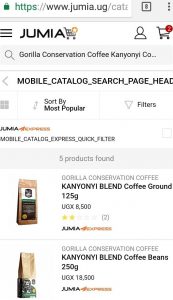
EXPLORE a great selection of genuine GORILLA CONSERVATION COFFEE on Jumia Uganda.

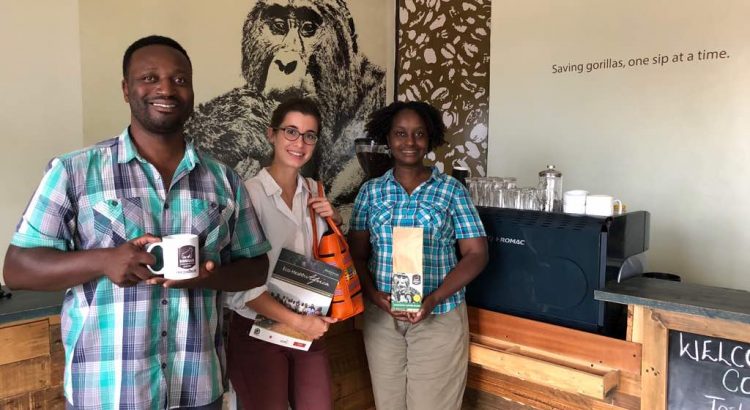
Visit us at Uganda‘s 1st Gorilla Conservation Café overlooking Lake Victoria in Entebbe.
ENJOY hand-picked coffee from farms neighboring Bwindi Impenetrable National Park
CHOOSE from our extensive menu of hot beverages, iced coffees and tasty snacks
RELAX with your friends on our outdoor terrace or take cup to go
SAVOR the unique taste of our coffee, which is medium roasted and has an aroma of caramel, butter notes and almond
LEARN how our enterprise helps smallholder farmers and conserves critically endangered mountain gorillas of Bwindi
SUPPORT our conservation programs by buying a bag of our #KanyonyiCoffeeBlend to take home
Click here to buy a bag at your favorite outlets locally in Uganda. Buy our coffee online for Uganda, New Zealand, USA and Canada delivery.
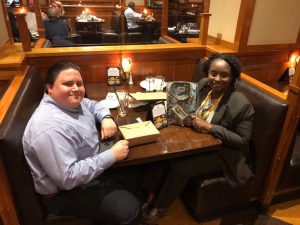
Entebbe and Washington, DC | 29 June 2018. We are proud to announce a new partnership between Pangols and Gorilla Conservation Coffee (GCCoffee), a social enterprise based in Entebbe, Uganda. GCCoffee offers premium prices for good coffee from farmers around Bwindi Impenetrable National Park, home to the critically endangered mountain gorillas. By providing a meaningful alternative livelihood to coffee farmers around Bwindi, the impact enterprise will reduce the farmers’ need to enter the gorilla habitat to poach or collect firewood to provide for their families.
20% of the net profits from every coffee bag sold is given to Conservation Through Public Health (CTPH) to sustain gorilla conservation and community health activities in frontline parishes around Bwindi also within the same farming communities. The sales of this coffee will allow for consumers in the US to directly change the lives of smallholder farmers and gorillas in Uganda, and they can know they are getting a great product with a great impact. To purchase Gorilla Conservation Coffee in the United States, please go to pangols.com.
Quote from Pangols, Founder and CEO, John Probert:
“I’m very excited for this partnership. I’ve read a lot about Gorilla Conservation Coffee, and its impact so far. I am thrilled to be able to help through Pangols to contribute to their mission of uplifting both farmers and gorillas around Bwindi. The mission of CTPH fits perfectly with the goals of Pangols, and with this partnership we can continue to directly impact people and wildlife”.
Quote from Gorilla Conservation Coffee, Founder and CEO, Dr. Gladys Kalema-Zikusoka
“I look forward to working with Pangols, an innovative and impactful enterprise. We share the same values and ultimate goal of sustaining wildlife conservation through supporting meaningful livelihoods for people who share a habitat with mountain gorillas and other endangered and threatened species.”
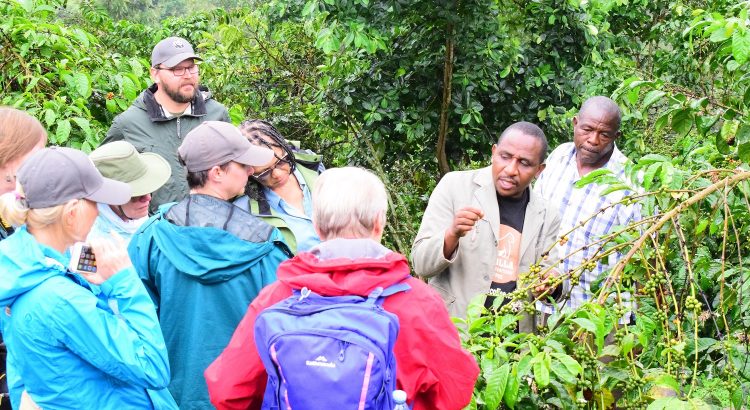
Stay with us at the CTPH Gorilla Conservation Camp in Bwindi Impenetrable National Park.
GO on the Gorilla Conservation Coffee Safari experience around Bwindi
LEARN how our enterperise helps smallholder farmers and conserves the endangered mountain gorillas of Bwindi
SAVOR the unique taste of our coffee, which is medium roasted and has an aroma of caramel, butter notes and almond
RECEIVE a free 125g bag of our single origin 100% Arabica #KanyonyiCoffeeBlend to take home
JOIN us in #SavingGorillasOneSipAtATime
For Gorilla Conservation Coffee Safari bookings,
email us: info@gorillacoservationcofffee.org
For Gorilla Conservation Camp reservations,
email us: gorillaconservationcamp@ctph.org
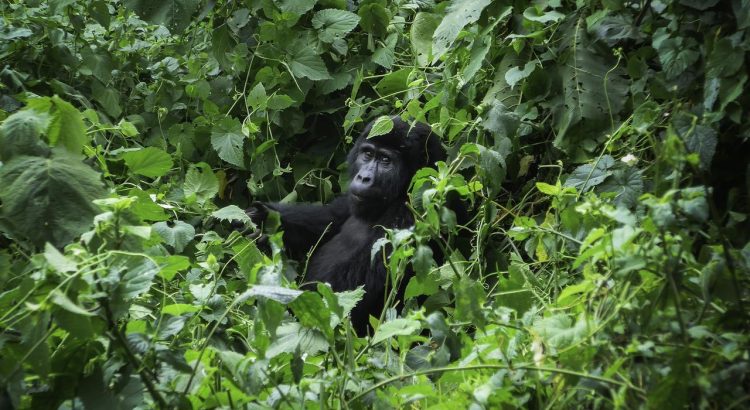
Posted on 22 March 2018
The monochrome mural of a silverback peers from behind whirring espresso machines at Gorilla Conservation Cafe in Entebbe, Uganda, a hip, downtown hangout that could easily fit into New York or London.
The same enchanting face emblazons bags of roasted arabica beans stacked on shelves, the fruits of a social enterprise that’s benefitting both gorillas and their human neighbours.
“Kanyonyi” — the name of the gorilla in question — “was one of my favourite mountain gorillas,” explains Gladys Kalema-Zikusoka, a Ugandan veterinarian and modern-day Dian Fossey, who launched the Gorilla Conservation Coffee project as an arm of her NGO Conservation Through Public Health.
Kanyonyi’s troop, Mubare (or M-group), were the first habituated gorilla group introduced to tourism 25 years ago this April. But sadly, earlier this year, Kanyonyi died from injuries sustained in a fight with a rival silverback, causing the group to fragment and leading to their temporary removal from tourism.
“I knew Kanyonyi since he was born 20 years ago,” says Gladys fondly, studying the image which also appears on T-shirts for sale. “He was a playful silverback who always liked interacting with tourists.”
Fittingly, the team decided to name its first blend after the silverback, allowing his spirit to live on in a project likely to change the lives of many.
A wave of densely forested hills rolling into misty skies, Bwindi is home to several of Uganda’s habituated gorilla groups — along with a rapidly increasing human population. With these neighbours coming into closer contact, it became apparent there was a need to alleviate any building pressures.
“Not everyone in the region can benefit directly from tourism,” explains Gladys, who was awarded the Golden Jubilee Award for distinguished service to the nation as a conservationist. “We’re working with farmers who sometimes poached to meet their basic needs. Our goal is to get them totally away from poaching.”
There’s a long history of coffee production in Uganda, although most farmers concentrate on the bitter robusta bean which is easier to grow. CTPH is encouraging farmers to improve methods and shift to arabica, a higher grade and more profitable coffee on the international market.
“During our first training sessions we realized the farmers all knew how to do it properly; they were just taking shortcuts. We told them that if they did it properly, we’d guarantee a premium price.”
In a market where prices fluctuate, it was an appealing proposition.
A portion of the final sales of coffee beans is donated to gorilla conservation, but an even greater result is an improved attitude from the community towards wildlife. Tourists, who can buy beans from lodges in the area and even Entebbe International airport, form a bulk of the consumer market – and their very presence relies on the existence of gorillas.
Reviving farmland which lay idle in his family generations, Sam is one of the 70-plus farmers currently benefitting from the Gorilla Conservation Coffee. Clambering down steep muddy slopes in the hills outside town, he excitedly shows me some of his plants and invites me to pick the ripe red cherries.
Sam, who is chairman of the Bwindi Coffee Farmers’ Co-operative, has just launched a one-hour coffee safari in conjunction with CTPH, inviting tourists to find out exactly how the bean to cup process works.
“I’m learning better techniques and every harvest I have a higher yield,” he tells me as we watch fresh cherries selected using a simple water system (the bad ones float to the top), and continue to see a fermented mixture pulped and dried. All the work here is done by hand.
Everyone — no matter how small their patch of land — is now interested in coffee production. “My wife, Juliet, has her own plot,” says Sam, admitting, “It’s much better than mine!”
“They do come,” laughs Sam. “But not very often. If they do, we get a member of HUGO (another initiative set up by CTPH) to chase them away.
More than anything, Sam is proud to drink his own coffee on his own farmland — an experience he invites me to share. “I’m very happy I can do this,” he says, sipping the thick back liquid heated on a stove. “It’s very special.”
I have to agree. And the coffee’s pretty good, too.
To buy Gorilla Conservation Coffee, visit ctph.org and gccoffee.org.
https://www.gadventures.com/blog/waking-gorilla-coffee-uganda/